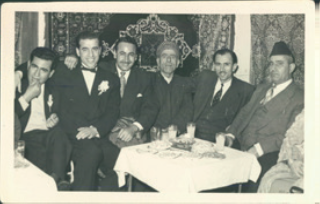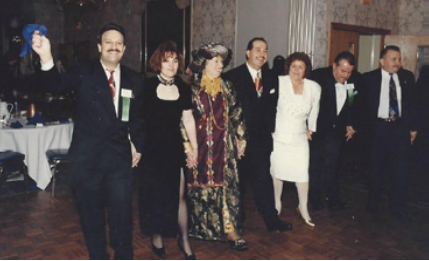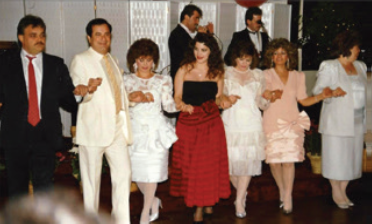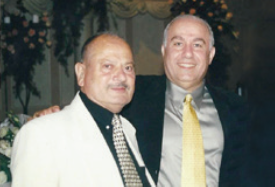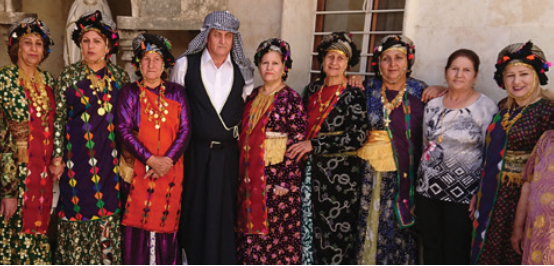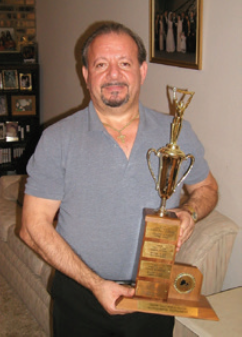Southfield Manor Part III: The Story Continues
By Adhid Miri
In this piece, the words and names come alive and speak to us about the golden days of Southfield Manor.
Entertainment and weddings were some of the main purposes to frequent the club. Group gatherings are an extraordinary way to bond with friends over food, beverages, and card games in the nighttime. Playing cards at the club was a huge attraction and an enjoyable social activity for our members.
The Games and the Gamers
Card games have always been very popular among Chaldean people. Any social gathering or family get together seems incomplete without them. Since childhood, we were taught a lot of card games to play with siblings, cousins and friends; no doubt to keep us occupied for many fun-filled hours.
For some card players, rearranging or shuffling a deck of cards and playing a couple of rounds of their most loved amusement is a tried-and-true method of loosening up toward the finish of a difficult day. These games were ideal for boosting memory and self-control plus improving intelligence and reasoning abilities. A route for individuals to take their brains off different things without much effort; for some members, an occasion to unwind and refocus.
Let me paint a picture: as you entered the building, you were faced with the two parts of the banquet facility. The left side was especially interesting with its mix of ladies and their husbands engaged in the pastime games of Kon-Kan, Poker, Wishlaiany, Dominos, plus the onlookers watching from the sidelines.
Familiar names and faces would fill the room and greet you with energy you as you entered. Najib, Shakir and Nouri Karmo, Thomas and Mike Denha, Jameel Yono, Salim Bahoura, Latif Yaldoo, Faieq Esshaki, Manuel and Jimmy Jonna, George Askar, Faraj Dally, Badie Bodiya, Sliwa Pattah, Gorgies Dakki, Yousif Kammano, Yousif Mckanni (Abo Tahseen), Roxi Yaldo, and Sabah and Gabriel Sinawi were regulars at the club.
A few younger members would be hanging around too, looking for a card game. Zuhair Karmo (Rzayjja), Mukhlus Karmo, Jerry Yaldo, and Johnny Koza, to name a few. Zuhair Yaldo was a distinct character with his multi-color polyester shirts and matching color slacks, with a large set of keys hanging on his side leading you to think he was a prison warden or high school superintendent.
The Grand Masters of Poker: I’m All In!
Poker is one of the most universally known card games in existence. The game we know as poker is believed to have ancient roots that go back nearly 1,000 years, crossing several continents and cultures. It is a man’s game. The gentlemen listed below showcase Southfield Manor’s best poker talent and players with the highest level of skills and guts in this fun game. The idea of listing these great poker players is simply to bring to the forefront the lesser known side of these Grand Masters.
The Hall and Activity Room
Table one was, without a doubt, the premier champions’ table was dominated by master players like Bassim Kassab, Mike Bahoura, Jamal Koza, Faris Kassab, Nouri Choulagh, Dr. Hillal Elia, Karim Toma, Phillip Shamas, Shawkat Fatoohi, Salman Yaldo, Rufi Ayar, Dawood Boji, Yousif Qarana, Charli Askar, Zuhair Jonna, and Fiktor Choulagh, among others. Ibrahim Choulagh and Amer Khames were regulars from Windsor, Canada. Abo Salih (Amin Tobia Summa) was a standby player and chips organizer.
This is where the ‘real’ poker game was happening, which attracted solid players. The poker chips were neatly prepared, counted and readied ahead of the arrival of the ‘champs.’ There was no time to waste in this high-stakes game. The chips organizer, Abo Salih, arrived an hour before the play to insure the availability of two new decks of cards (the Axe type) plus poker chips of various denominations. Dollar chips were white, five dollars were red, ten were green, fifty were yellow and one hundred dollar chips were black. This group would never accept replacing the poker chips with jellybeans or M&M colored candies.
The game was mostly fair; however, at times with either heavenly intervention or swift collection by a nimble hand during the shuffle, a few high value chips would miraculously disappear from the pot to the astonishment of the winner! A cover up debate would quickly ensue in order to dismiss any legal claim, as the players readied for the next round. By the end of the night some were poorer, others a lot happier. At times, the games would continue after closing to one of the players’ homes, playing through to the morning when they got kicked out by the host’s wife!
There were a few other tables around the poker room. Table two’s team was Sammi Kassab, Oraha Shounia, Sabri Denha, Mike Denha, and Ramzi Giezy. Table three had Salim Yaldo, Basil Boji, Freddie Najor, Mike Khami, Khalid Kalasho, Yalda Atty, George Abbo, and Zuhair Yaldo.
A pre-Grand Masters game was played during the first five years of the club at a table near the hall’s kitchen door. The game was Dealer’s Choice/ Cincinnati/ High & Low.
The original players were Bassim Kassab, Zeek Zebari, Sliwa Battah, Edward Gorieal, Sabah Attisha, Karim Toma, Rufi Ayar, Sabah Isho (Abo NuNu), and Ibrahim Choulagh from Canada.
Samir Ajemy, the manager, was very supportive of the player’s needs and stayed with the players as the game extended to the early hours of the morning. At times he would personally deliver carryout to player’s home to feed a relocated game and was then frequently invited to join the ongoing poker game. Samir, though, was an amateur and no equal to the poker masters. Almost always, he would lose all his pocket cash plus the delivery money he’d received!
KonKan
This is primarily a lady’s game. Konkan is the most popular Chaldean card game for all ages and across the globe. The Indians, Chinese and Spanish people play a similar variation of this popular game. History books are written about Konkan in order to explore the origin of this amazing game.
Konkan was a very popular game among the club ladies who occupied the left side of the hall, where they enjoyed playing cards as a source of fun and excitement. Playing cards was always in fashion as an ideal way to reconnect with family and friends, especially with those not seen in a long time.
Most people play card games for the entertainment value it provides, reaping the benefits of bolstering emotional and mental health. Card games like KonKan, Wishlaiany, and Poker keep the mind active, boosts concentration, and offers a social outlet - key factors for a happy and cheerful life.
The Ladies Konkan tables were usually made of the same five players and most of them played together on Tuesdays, Thursdays & Saturdays.
The regulars teams were: Virginia (Nadhir) Denha, Rabab Binno, Ann Jonna, Virginia Kassab, and Suham Mackani; Sherina (Nadhir) Kashat, Bernadette Sarafa, Hayat Sesi, Thuraiya Kassab, and Georgette Karmo; Asia Shouniya, Joan Garmo, Linda Zebari, and Ilham Elia; Ikhlas Qa-Korkies, Ikhlas Najor, Azhar Koza, Feryal Dano, and Lulu Koza; Mary Dabbish, Enam Toma, Samira Yaldo, Lilly Yono, and Suham Boji; Goorjia Jonna, Gladys Koza, Naama Toma, Warda Koza, and Mary Jane Farida; Margreete Esshaki, Najiba Shounia, Andrea George, Amira Giezy, Rejo Koza, and Zihoora Kalabat; and Violina Kassab, Bassima Ayar, Ghalia Segmani, Suham Hannawa, and Sundus Jonna.
The most famous male players of KonKan were: Thomas Denha, Mike Denha, Thomas Farida, Najeeb Karmo, Ramzi Giezy, and Salim Mackhay; and Salah Shouniya, Roxi Zebari, Gorgies Yono, Faraj Dikho, and Yousif Garmo.
Wishlaiany
Hanna Shina is a man for all seasons and all reasons. He is considered the ultimate event organizer, an actor, athlete, Tawli master, Wishlaiany great, Dominos expert, Pin-Pong star, and Poker specialist as well as a club connector. He oversaw all gaming prizes and purchased the winners’ trophies from Dearborn to award the top winners. The top prize, a set of worry beads (Yussor), was valued at one hundred dollars.
Hanna Shina’s services to the club and the membership were both unlimited and unconditional. He was involved whether in/out of the CIAAM board or on committee. In fact, he was so popular, in the 2003 board elections, Hanna obtained the highest number of votes (359 of 540), 66% of the votes - without campaigning! (A percentage never again achieved before or after by any candidate in the club history.)
September 2002 marked the first world cup of Wishlaiany, held at Southfield Manor with 16 teams. Each team was made up of 3 expert players, world renowned in deciphering facial signs, winks, lip biting, and eyebrow movements, chin twisting and other faking maneuvers, all contrary to the universal laws of gravity!
The semi-finalists teams were Fouad Garmo, Zuhair Garmo, and Thomas Farida; Fakhri Garmo, Riyadh Jiddo, and Mwafaq Yaldo; Mukhlis Shammami, Johnny Yalda, and Hussam Abbo: and finally, Bishop Ibrahim Ibrahim, Father Sulaiman Denha and Father Manuel Boji.
Team Number One emerged as the champions after beating Team Number 3 on September 18, 2002. (Evidently there was no heavenly intervention as the Bishop-led clergy team was defeated.)
Other top teams were as follows: Bassim Binno, Najeeb Zebari, Manuel Najor, and Shibbib Kaskorkis; Louie Boji, Oraha Shouniya, Ramzi Giezy, and Mike Denha; Karim Dabbish, Manuel Meram, Mike Denha, and Hanna Dikho (on Tuesday nights); Zeek Zebari, Louie Boji, Thomas Denha, Sabri Denha, and Mike Denha (every Thursday night); Hanna Shina, Mukhlus Karmo, Jalal Jameil, and Ramzi Garmo; Nadir Shammami, Zidan Hannawa, and Charli Semaan; Paul Sitto, Dr. Malik McKani, and Zuhair Koza; Sabah Sigmani, Zuhair Ayar, and Salem Khamerco; Rufi Ayar, Hussam Denha, and Mike Denha; Karim Dabish, George Odish, and Azziz Dabish; Mike Dikho, Manuel Meram, Bahi Sesi, and Hanna Dikho; Jameel Nafsu, Yousif Nafsu, and Nazar Nafsu; and Adil Kalabat, Zuhair Kalabat, and Johnny Arafat.
Tawli (Backgammon), Domino and Billiards
Southfield Manor backgammon boards were hand made by Fouad Atto. This Babylonian master carpenter inherited the trade and crafted the Sumerian invention units to perfection. From the dice set to the game 30-piece selection, the shape, color, size and weight to the wood selection and stain veneer were perfect.
Originally priced at around one hundred and fifty dollars in 1980, by the nineties, due to inflation and high demand, the price rose to two hundred and fifty dollars. For a little extra, the backgammon case would be engraved with a golden plaque and signature - a gift proudly made by Fouad Atto.
Fouad was a good Tawli maker, yet a lesser player who frequently lost to other players. During a visit to Iraq in the nineties, boasting about his international skills, he was beaten decisively by three young Atto nephews. The youngest, aged fifteen at the time, beat him 5-0! (Fouad Atto –Adhid picture)
Other passionate Tawli players at the club included Bassim Kassab, Hanna Shina, Joury Kas-Mikha, Harry Dikho, Dr. Hillal Elia, Sabah Attisha, Mukhlus Shammami, Salman Qarana, Dr. Peter J. Kalabat, Paul Sitto, Naji Bahoura, Johnny Yalda, Raad Kathawa, Salman Konja, Najib Samouna, Louis Estephan, Bishop Ibrahim Ibrahim, Father Manuel Boji, and Father Sulaiman Denha.
The first Backgammon champion in Southfield Manor History was Dr. Peter J. Kalabat in 1982.
The champion of the 2003 tournament was Sabah Attisha. Bassim Kassab was crowned as champion in 2004 after defeating Hanna Shina in the finals. Notable past champions include Joury Kas- Mikha, Harry Dikho, Hanna Shina, and Fouad Atto.
The Domino masters were Karim Sarafa, Mansouri Sitto, Mikha Sheena, Hanna Dikho, Azziz Dabish, Bahi Sesi, Dr. Shakib Halabu, Habbib Yaldo, Salim Jiddo, and Ramzi Giezy.
Some gamers enjoyed Billiards at the club. Among these were Louis Estephan, Habbib Qashat, Thomas Denha, Shibeeb Qas Korkis, Jack Najor, Habbib Garmo, Sabah Najor, and Fouad Atto. Table tennis was also played in the early days and the champions were usually Hanna Shina, Nafe Batah, or Sarmad Jabiro.
With a clock on the side and asking for limited noise, Freddie Najor and Mike Khami were some of the few that played chess at the club.
Chaldean Weddings
Like other cultures, Chaldeans have their own traditions, styles, and needs when it comes to weddings. And if there’s one thing that Chaldeans are most known for in the United States, it’s their extravagant weddings. For the bride and groom, a typical wedding is a long, joyous day filled with multiple parties, an abundance of food, and (almost too much) dancing. When Chaldeans celebrate a wedding, they truly celebrate.
The “right” banquet hall is extremely important for Chaldean weddings. They usually have a high guest count, which means that the banquet hall must offer ample space to accommodate everyone comfortably. You can expect anywhere from 500 to 1,000 guests for a standard wedding. That’s a lot of aunts, uncles, and cousins!
Dancing is a large part of the culture, and guests usually dance from the beginning to the very end. The banquet hall had a large dance floor for guests to celebrate the night away.
Southfield Manor has been a feature of the area’s local culture for as long as most people can remember. It was the landmark of its time and quickly became a center for all major events and community functions, especially weddings. The Southfield Manor provided one of the best wedding banquet halls in the Oakland County area.
In the fourth and last part of this series we will cover the farewell of The Southfield Manor, the committees, the social events and management team that were part of its colorful folklore, traditions, and history.
Read the first and second installment of this series at chaldeannews.com/culture-and-history. If you have a photo to share, submit it to edit@chaldeannews.com along with a caption to be featured in the story. We are always looking to add more traditions and pictures to our articles and photography collection, so we encourage you to contact us if you have any additional insight. With your help we hope to create the most comprehensive list of past and present wedding traditions.
Acknowledgements for contributions by Hanna Shina, Adil Bacall Nabby Yono, and Bassim Kassab. Special thanks to Jacqueline Raxter for assistance with editing.

